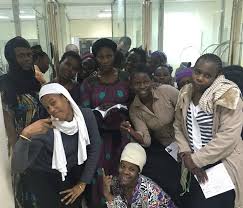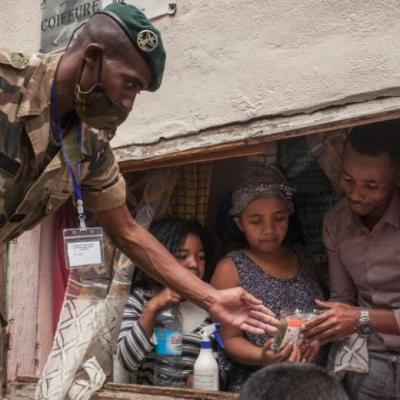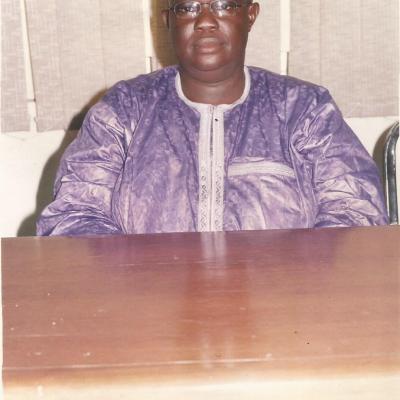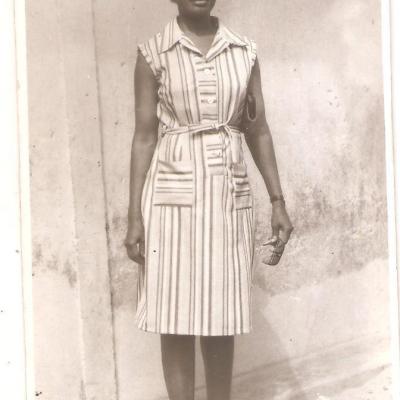Happenings
Events, People and Places
-
Workers Welfare : Michael Imoudu as a Role Model 2
- On 22/05/2018
- In Solomon's Column
The need for an increase in wages and better working conditions prompted Michael Imoudu to lead a demonstration from the locomotive yard in Ebute metta, Lagos to the Government House situated at Marina, Lagos Island, Lagos.
The Governor General of the Colony of Lagos, Bernard Bourdillon noticed that any form of industrial action at that period, could disrupt railway supplies to the coalition, during the Second World War in 1941. It was on this premise he acceded to a 50 per cent pay rise for the workers.
This success, further inspired Imoudu to put forward more demands, among which were conversion of daily casual labour to salaried employment, Saturday work with pay, permanence of daily labour, holiday travel grant and payment of arrears to cover 1932 to 1942 of unpaid entitlements.
This did not go down well with Bourdillon, who facilitated the termination of Imoudu’s appointment on 23 January, 1943 and also ordered his arrest under the Nigeria General Defense Regulations, 1941.
In quick succession he was relocated and remanded at the Benin prison, while in prison, he influenced inmates to demonstrate against poor feeding and other deplorable prison conditions.
In response, the British Colonial Government in 1943, restricted Imoudu’s movement to the palace of the paramount Chief of Auchi and made an order for him to report twice a week to the Auchi Police station.
As a result of a face off with the District Officer of Auchi and his moves to facilitate the establishment of peasants’ cooperatives for the benefit of peasants in Etsako and Ora, he was again remanded in the Auchi prison.
Some of his comrades, including T.A Bankole openly spoke against Imoudu’s action, to the hearing of the Chief Secretary of Government.
After spending two and a half years in prison, the labour activist was set free.
A mass rally was held at Oko-Awo, Lagos to celebrate his release from prison, while nationalists such as Herbert Macaulay were on ground to grace the occasion.
In June 1945, he successfully led over 30,000 workers to down tools for 44 days.
The industrial action was hinged on the inability of the colonial Government to actualize the promise of Bourdillon in 1942, to review allowances according to living index.
Bourdillon’ successor, Arthur Frederick Richards vigorously refused to pay the allowance.
This resulted in the abrupt end of the unpopular Richards constitution, and set the stage for self government.
-
Clerics Should Make Use of Religion for National Integration and Unification-Prof Olagoke
- On 21/05/2018
- In News
The Founder and Spiritual Head of Shafaudeen In Islam Worldwide, Wakajaiye, Ibadan, Nigeria, Prof. Sabitu Olagoke has charged religious leaders in Nigeria to make use of religion as a weapon of integration, unification and reformation during and after the Ramadan fast.
Prof. Olagoke gave this charge in a chat with Federationews2day.
''An area of challenge for clerics, we must use religion as a weapon to integrate, not disintegrate, to unify and to reform, in the atmosphere where the people who have must support the cause of clerics, because to reach out to millions of people, the media is essential.''
''Ramadan fast is to reform, restrengthen and do things the right way. Our elites must come in, everywhere, we see people who have and those who do not have. We must be our brother's keeper,'' Prof. Olagoke advised
-
We have dispute with FG not NGO-JOHESU
- On 21/05/2018
- In News
Govt. Has Failed in Its Responsibilities-AWC
Health workers in Nigeria have clarified that the ongoing indefinite industrial action was embarked upon to compel the Federal Government to meet their demands, just as they insisted that they have no dispute with any Non Governmental Organization.
This clarification was made in a chat with Federationews2day by the spokesperson of the Oyo state council of the Joint Health Sector Union(JOHESU), Comrade Olabode Akinfenwa.
''We are not in dispute with any Non Governmental Organization(NGO), we are in dispute with the Federal Government. Also, we are not aware of the National Industrial Court Judgement. We have local issues that are yet to be addressed by the Oyo state Government. There is preferential treatment in the health sector'', Comrade Akinfenwa noted.
In the same vein, the All Workers Convergence(AWC) has attributed the indefinite strike action embarked upon by health workers in the country to the fact that government at all levels have abandoned their responsibilities. It only shows how irresponsible government is. Is it a Non Governmental Organization(NGO) that will intervene in such a sensitive issue that has to do with the health of Nigerians. Even the NGO cannot be trusted. It might likely have an ulterior motive. Government in Nigeria has lost its sense of Justice and equal rights''.
This position was made known by AWC's National Coordinator, Comrade Andrew Emelieze.
''Painfully, it is the traveling out of President Muhammadu Buhari, for medical consultation to London, when the health sector has been grounded by a nation wide strike, that is making its suspension difficult, even though the President traveled out to save his life. For us, in AWC, this act is not only irresponsible, but callous'', Comrade Emelieze noted.
-
Ugandan Lawmakers Propose Probe of Girls in Slave Camps in Dubai
- On 17/05/2018
- In News
Members of the Ugandan Parliament have proposed the setting up of a special committee to look into the allegations of slave labour involving several girls from the country, in Dubai, United Arab Emirates(UAE).
According to the member representing Butambala in the Parliament, Mr Muhammad Muwanga Kivumbi a visit Dubai by the lawmakers of Budget Committee, exposed a labour recruitment centre, "which for all intent and purpose resembles a well-organised slave market".
Kiyumbi disclosed that when the committee visited Jaira state, it discovered girls from various countries, accommodated in several small buildings, patiently waiting to be sold to buyers with the ''highest bid''.
He also stated that the girls were being maltreated, while lamenting that 16 of them had committed suicide between February and August 2017.
-
Redeployment of Senior and Junior Staff of Nigerian Universities to Education Ministry Imminent
- On 15/05/2018
- In Special Report
A systematic dismembering of the manpower structure in Nigerian universities has began in earnest.
The plot engineered by some politically exposed Academics, according to investigations is designed to ease out all senior and junior staff in the universities, for the benefit of the academic staff.
If the plot sails through, the affected staff will then become the financial responsibilities of the Federal Ministry of Education.
Carefully contrived by a number of academic staff presently enjoying political patronage from high ranking political office holders, the plot will ensure that only lecturers are on the payroll of the universities.
Well informed sources, insist that senior and junior staff are to be redeployed to the Federal Ministry of Education, while a few of them would be seconded to the universities.
This according to the sources would pave the way for a special salary scale for the academic staff, while salaries of the others would be determined by the government.
However, educationists warn that such a plot could destabilize the university system, just as they insisted that those behind the plot were only promoting their selfish interests.
They berated the President for engaging the services of professionals, who had already led government astray.
-
Workers Welfare : Michael Imoudu As A Role Model 1
- On 15/05/2018
- In Solomon's Column
The activities of Labour leaders today is the raging debate among workers in Nigeria. Workers express sadness and worry over the way their leaders handle issues concerning them.
While the workers continue to wallow in the vicious cycle of poverty, hunger and worry, their leaders insist that they should be patient and show understanding with the Government.
The agility and activeness of labour leaders of the present time, is determined by the political class and not by the deteriorating condition of workers in the country.
Up till this moment, the name Michael A thokhamien Imoudu, represents a good example of a labour leader with a difference within the Nigerian territory and has continued to serve a s a source of inspiration for the present set of labour leaders. Perhaps.
Imoudu was born on 7, September, 1902, to a Soldier, who had fought in East Africa. His upbringing resulted into his fearless personality. He did not have fear for witches or wizards, master or servant, black or white.
At the age of 14, he began his education at the Government school, Ora. In the course of his education, he received double promotion to standard one. After the death of his Father, the forward looking young Imoudu moved on in his quest for education, at various times at Ontisha, Benin, Sapele, Warri and Agbor.
His adult life revolved on protests against wrong doing by constituted authority. As a student of the Government school, Agbor he staged his first protest.
He led students of the school to protest against the alleged embezzlement of Empire funds by the school’s teachers. This resulted in the manhandling of the Headmaster.
At various times, he worked as linesman in the Department of Post and Telegraph (P and T) in 1928 and an apprentice machinist at the Railway Corporation. He worked tirelessly on three shillings and four pence per day. The work conditions depressed those in the railway and it was noticeable, but the grievances of the railway men were uncoordinated. During the industrial action of the sectional foundery men in 1931, Imoudu spearheaded a platform to fight for the rights of workers. This he made possible by opting to work as journey man at a reduced wage of three shillings per day.
On 20, January, 1940, Imoudu was the only one among his colleagues, who signed the registration document of the Railway workers union and on 7, October, 1940, Imoudu was elected President of Railway men.
-
Rwandan Govt. Begins ICT Education in Schools
- On 14/05/2018
- In Special Report
The Rwandan Government has introduced Information and Communication Technology(ICT) education in schools in the country.
The policy ''smart class rooms" seeks to incorporate ICT into various aspects of the country's education system and reform teaching and learning systems.
According to the Director General of Rwandan Education Board(REB), Dr Irénée Ndayambaje, who made this known , recently, in a training session for teachers on the use of ICT in schools in Kigali, the policy is also intended to integrate technology in all education processes such as preparation, delivery of lessons, assessments, research among others.
He stressed that the target is to have 1,500 schools equipped with smart classrooms. Presently, only 645 schools are equipped in the country.
-
Families in East Africa Contend with High Cost of Food Prices
- On 14/05/2018
- In News
Families in East Africa will for sometime contend with high food prices as a result of flooding, pests and diseases.
This is contained in the monthly update by the Food Security Working Group on the Greater Horn.
The update disclosed that families in Rwanda, Karamoja of Uganda, Burundi, Somalia and Sudan which depend on markets for food, will have to put up with the soaring prices of foodstuffs.
"Above average staple food prices will continue eroding the purchasing power of poor market-dependent households in Uganda, Rwanda, Somalia and Sudan, which are heading into a lean season," the report stated.
The past week maize traded at $402.14 per tonne in Kisumu, Kenya, $319 in Ruhuha, Rwanda and $ 271.02 in Kabale town, Uganda.
However, in the last six months a tonne of maize traded at $540.28 in Ruhuha, $279.38 in Uganda and $443.04 in Nairobi. In Burundi, only 60 per cent of households have food.















